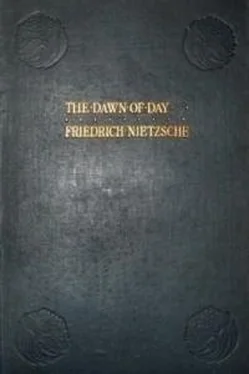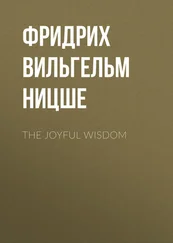105.
PSEUDO–EGOISM.—The great majority of people, whatever they may think and say about their “egoism,” do nothing for their ego all their life long, but only for a phantom of this ego which has been formed in regard to them by their friends and communicated to them. As a consequence, they all live in a haze of impersonal and half–personal opinions and of arbitrary and, as it were, poetic valuations: the one always in the head of another, and this head, again, in the head of somebody else—a queer world of phantoms which manages to give itself a rational appearance! This haze of opinions and habits grows in extent and lives almost independently of the people it surrounds; it is it which gives rise to the immense effect of general judgments on “man”—all those men, who do not know themselves, believe in a bloodless abstraction which they call “man,” i.e. in a fiction; and every change caused in this abstraction by the judgments of powerful individualities (such as princes and philosophers) produces an extraordinary and irrational effect on the great majority,—for the simple reason that not a single individual in this haze can oppose a real ego, an ego which is accessible to and fathomed by himself, to the universal pale fiction, which he could thereby destroy.
106.
AGAINST DEFINITIONS OF MORAL AIMS.—On all sides we now hear the aim of morals defined as the preservation and advancement of humanity; but this is merely the expression of a wish to have a formula and nothing more. Preservation wherein? advancement whither? These are questions which must at once be asked. Is not the most essential point, the answer to this wherein? and whither? left out of the formula? What results therefrom, so far as our own actions and duties are concerned, which is not already tacitly and instinctively understood? Can we sufficiently understand from this formula whether we must prolong as far as possible the existence of the human race, or bring about the greatest possible disanimalisation of man? How different the means, i.e. the practical morals, would have to be in the two cases! Supposing that the greatest possible rationality were given to mankind, this certainly would not guarantee the longest possible existence for them! Or supposing that their “greatest happiness” was thought to be the answer to the questions put, do we thereby mean the highest degree of happiness which a few individuals might attain, or an incalculable, though finally attainable, average state of happiness for all? And why should morality be the way to it? Has not morality, considered as a whole, opened up so many sources of displeasure as to lead us to think that man up to the present, with every new refinement of morality, has become more and more discontented with himself, with his neighbour, and with his own lot? Has not the most moral of men hitherto believed that the only justifiable state of mankind in the face of morals is that of the deepest misery?
107.
OUR RIGHT TO OUR FOLLY.—How must we act? Why must we act? So far as the coarse and immediate needs of the individual are concerned, it is easy to answer these questions, but the more we enter upon the more important and more subtle domains of action, the more does the problem become uncertain and the more arbitrary its solution. An arbitrary decision, however, is the very thing that must be excluded here,—thus commands the authority of morals: an obscure uneasiness and awe must relentlessly guide man in those very actions the objects and means of which he cannot at once perceive. This authority of morals undermines our thinking faculty in regard to those things concerning which it might be dangerous to think wrongly,—it is in this way, at all events, that morality usually justifies itself to its accusers. Wrong in this place means dangerous; but dangerous to whom? It is not, as a rule, the danger of the doer of the action which the supporters of authoritative morals have in view, but their own danger; the loss which their power and influence might undergo if the right to act according to their own greater or lesser reason, however wilfully and foolishly, were accorded to all men. They on their part make unhesitating use of their right to arbitrariness and folly,—they even command in cases where it is hardly possible, or at all events very difficult, to answer the questions, “How must they act, why must they act?” And if the reason of mankind grows with such extraordinary slowness that it was often possible to deny its growth during the whole course of humanity, what is more to blame for this than this solemn presence, even omnipresence, of moral commands, which do not even permit the individual question of how and why to be asked at all? Have we not been educated precisely in such a way as to make us feel pathetic, and thus to obscure our vision at the very time when our reason should be able to see as clearly and calmly as possible— i.e. in all higher and more important circumstances?
108.
SOME THESES.—We should not give the individual, in so far as he desires his own happiness, any precepts or recommendations as to the road leading to happiness; for individual happiness arises from particular laws that are unknown to anybody, and such a man will only be hindered or obstructed by recommendations which come to him from outside sources. Those precepts which are called moral are in reality directed against individuals, and do not by any means make for the happiness of such individuals. The relationship of these precepts to the "happiness and well–being of mankind" is equally slight, for it is quite impossible to assign a definite conception to these words, and still less can they be employed as guiding stars on the dark sea of moral aspirations. It is a prejudice to think that morality is more favourable to the development of the reason than immorality. It is erroneous to suppose that the unconscious aim in the development of every conscious being (namely, animal, man, humanity, etc.) is its “greatest happiness”: on the contrary, there is a particular and incomparable happiness to be attained at every stage of our development, one that is neither high nor low, but quite an individual happiness. Evolution does not make happiness its goal; it aims merely at evolution, and nothing else. It is only if humanity had a universally recognised goal that we could propose to do this or that: for the time being there is no such goal. It follows that the pretensions of morality should not be brought into any relationship with mankind: this would be merely childish and irrational. It is quite another thing to recommend a goal to mankind: this goal would then be something that would depend upon our own will and pleasure. Provided that mankind in general agreed to adopt such a goal, it could then impose a moral law upon itself, a law which would, at all events, be imposed by their own free will. Up to now, however, the moral law has had to be placed above our own free will: strictly speaking, men did not wish to impose this law upon themselves; they wished to take it from somewhere, to discover it, or to let themselves be commanded by it from somewhere.
109.
SELF–CONTROL AND MODERATION, AND THEIR FINAL MOTIVE.—I find not more than six essentially different methods for combating the vehemence of an impulse. First of all, we may avoid the occasion for satisfying the impulse, weakening and mortifying it by refraining from satisfying it for long and ever–lengthening periods. Secondly, we may impose a severe and regular order upon ourselves in regard to the satisfying of our appetites. By thus regulating the impulse and limiting its ebb and flow to fixed periods, we may obtain intervals in which it ceases to disturb us; and by beginning in this way we may perhaps be able to pass on to the first method. In the third place, we may deliberately give ourselves over to an unrestrained and unbounded gratification of the impulse in order that we may become disgusted with it, and to obtain by means of this very disgust a command over the impulse: provided, of course, that we do not imitate the rider who rides his horse to death and breaks his own neck in doing so. For this, unhappily, is generally the outcome of the application of this third method.
Читать дальше











